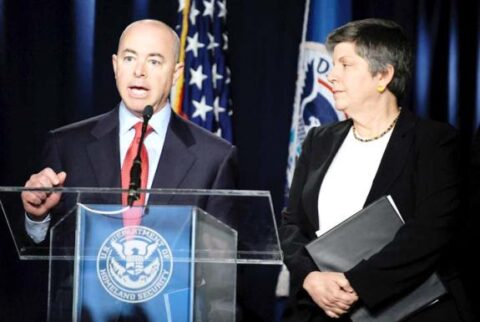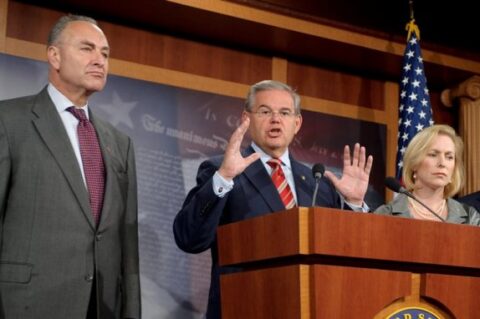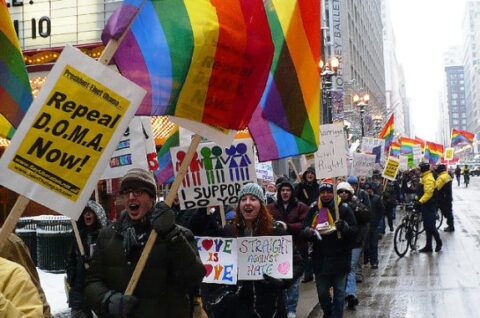Reform

DHS Acknowledges that U.S. Immigration Policy Needs to Spark Economy and Attract Entrepreneurs
By PAUL ZULKIE, PRESIDENT OF THE AMERICAN IMMIGRATION COUNCIL Yesterday, Department of Homeland Security (DHS) Secretary Janet Napolitano and U.S. Citizenship and Immigration Services (USCIS) Director Alejandro Mayorkas announced a series of policy initiatives designed to “fuel the nation's economy and stimulate investment” by attracting foreign entrepreneurs who can invest in fields of high unemployment, create jobs, and form startup companies. It is encouraging that USCIS recognizes that immigrant entrepreneurs and innovators are a key to continued growth and to maintaining America’s competitive edge into the 21st century. It’s important that the agency keep this recognition in mind as it adjudicates visa petitions and applications. Read More

President Obama Promises to Keep Promising Immigration Reform at Latino Conference
Amid frustrated shouts of “Yes, You Can!” from advocates in the audience, President Obama again deferred the power to fix our broken immigration system to Congress today during a speech at the National Council of La Raza’s (NCLR) annual conference. After highlighting his administration’s bona fides on issues important to the Latino community—appointing Justice Sonia Sotomayor on the Supreme Court, naming Labor Secretary Hilda Solis to his cabinet and delivering health care to millions of Latino families—the President turned to the thorny issue of our broken immigration system—a system many advocates believe the President should fix using the power of executive authority. Read More

Dear Mr. Smith, Our Broken Immigration System Requires Solutions that Embrace Discretion, Not Eliminate It
Over the last six months, Congressman Lamar Smith (R-TX), along with other members of the House Judiciary Committee, have engaged in an all-out effort to turn back the clock on our immigration laws through a series of bills that may tackle one issue at a time, but equal a comprehensive overhaul. This week, the restrictionists’ Comprehensive Immigration Reform package (RCIR, as we call it) became complete with the introduction of the “Hinder the Administration’s Legalization Temptation Act” (HALT Act), a bill that would suspend discretionary forms of immigration relief until January 21, 2013. Yes, until the day after the next inauguration. Read More

What Does Record Low Migration From Mexico Mean for Immigration Reform?
In what could be an historic event, the number of unauthorized immigrants coming from Mexico to the United States has fallen drastically in recent years—dropping from 525,000 annually in 2000-2004 to fewer than 100,000 in 2010. In fact, unauthorized immigration from Mexico has dropped to a net rate of zero—meaning that the number of new migrants entering the United States each year is roughly equal to the number who leave or die. That is one of the central conclusions to emerge from new research by the Mexican Migration Project (MMP) at Princeton University and the Universidad de Guadalajara. Read More

Restrictive Immigration Law Continues to Threaten Georgia’s Farming Industry
Just days after part of Georgia’s immigration law, HB 87, went into effect, farmers in the Peach State are panicking over how they will find enough workers to harvest their crops—some of which are already starting to spoil. Although a federal judge granted a preliminary injunction enjoining two key provisions of HB 87 last month, the provision requiring employers to verify the immigration status of new hires (E-Verify) went into effect July 1. In an industry where 80% of workers are said to be undocumented—and few American citizens, legal workers or even convicted criminals are willing to step in to do the work—Georgia farmers are now speaking up about how future labor shortages will impact the state’s $1.1 billion industry. Read More

The Difference between E-Verify in a Comprehensive Immigration Reform Bill and E-Verify Alone
Last month, Rep. Lamar Smith introduced the “Legal Workforce Act of 2011” (H.R. 2164), a bill which would make the E-Verify system mandatory for all employers within three years. While the Smith bill version of mandatory E-Verify has been criticized for snagging U.S. citizens and legal workers, burdening employers with additional costs and not actually catching unauthorized workers, Sen. Robert Menendez’s recent bill, “The Comprehensive Immigration Reform Act of 2011,” also includes mandatory E-Verify. So why would folks support the Menendez bill when they keep hearing that E-Verify is so bad? Read More

California’s Tuition Equity Law Upheld by U.S. Supreme Court
BY SUMAN RAGHUNATHAN, PROGRESSIVE STATES NETWORK Proposals to increase educational access for students (particularly the undocumented) continue to advance in state legislatures nationwide, even as they are being upheld in the nation’s courts. Earlier this month, the U.S. Supreme Court reinforced and upheld California’s tuition equity law, the nation’s oldest and one of the strongest tuition equity models nationwide, by choosing not to consider a challenge to the law. California’s law, AB 540, passed a decade ago and was already unanimously upheld by the State’s Supreme Court last November. Read More

Sen. Menendez Introduces Comprehensive Alternative to Enforcement-Only Immigration Legislation
While some in Congress continue attempts to enforce a way out of our immigration problems, others, like Senator Robert Menendez (D-NJ), are offering balanced solutions that address not just one, but many facets of our broken immigration system. Today, Senator Menendez (D-NJ), along with Senators Harry Reid (D-NV), Patrick Leahy (D-VT), Richard Durbin (D-IL), Charles Schumer (D-NY), Kristen Gillibrand (D-NY) and John Kerry (D-MA), introduced the “Comprehensive Immigration Reform (CIR) Act of 2011,” a bill which offers a comprehensive framework for lasting reform. Read More

Pending a Resolution of DOMA, Immigration Judges Should Exercise Discretion to Stay Removal Cases
BY BETH WERLIN AND VICTORIA NEILSON To date, five states plus the District of Columbia celebrate marriages of gay and lesbian couples and several other states honor such marriages. In addition, five countries, including Canada, permit marriages of gay and lesbian couples and at least fourteen additional countries recognize same-sex relationships for immigration purposes. Yet, because the U.S. immigration agencies rely on section 3 of the Defense of Marriage Act (DOMA)—defining marriage as a union between one man and one woman—lesbian and gay U.S. citizens and lawful permanent residents are barred from obtaining immigrant visas for their spouses, visas that are available to heterosexual U.S. citizens and residents with foreign-born spouses. Gay and lesbian noncitizens also are precluded from obtaining other immigration protections, including relief from removal, based on a marriage to a U.S. citizen or permanent resident. As a result, families are separated and spouses of U.S. citizens and lawful permanent residents are deported from the United States. Read More
Make a contribution
Make a direct impact on the lives of immigrants.
